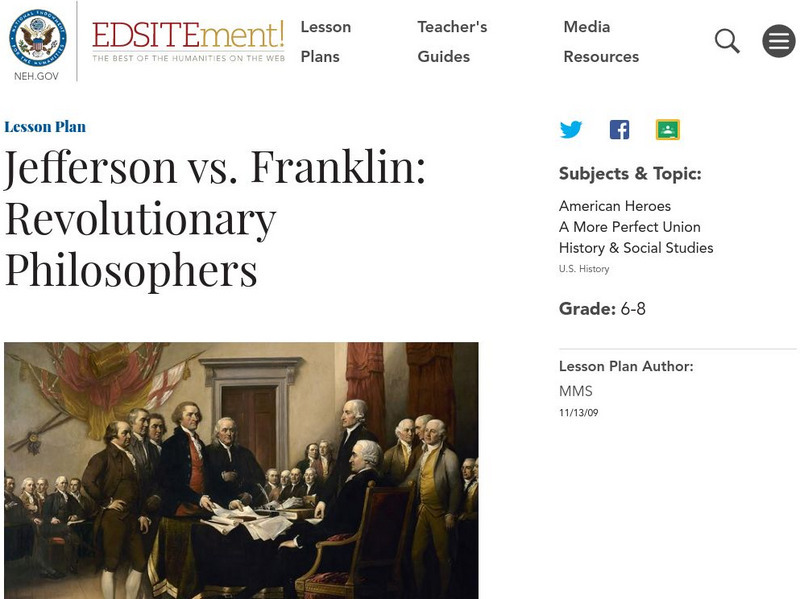National Endowment for the Humanities
Lost Hero: Was John Hanson Actually the First President?
The first president of the United States was ... John Hanson? Scholars investigate the notion that the initial leader of the nation was not George Washington. Using research, articles, and open discussion, individuals create a quest for...
National Endowment for the Humanities
The "To Do List" of the Continental Congress
What is on your to-do list today? The second lesson of a three-part series on Lost Heroes of America investigates the laundry list of items in front of the second Continental Congress. Scholars research, analyze, and present information...
National Endowment for the Humanities
Chief Executives Compared: The Federalist Papers
Delve into the responsibilities of the president by looking at President Hamilton's opinion of the presidential office in his own words. The second in a three-part series, the resource also offers an interesting compare-and-contrast...
Curated OER
What Experiences Shaped the Founders' Thinking about Government?
Learners study the ideas and experiences that shaped the founding fathers' perspective about government. In this the government lesson plan, students examine the Articles of Confederation as they relate to the power of government....
Curated OER
The Federalist Debates: Balancing Power Between State and Federal Governments
Students examine the pros and cons of state sovereignty vs. federalism, as argued by the Founding Fathers. They identify the basic positions of each side, complete a worksheet, and write a persuasive essay arguing for Jefferson or Hamilton.
Curated OER
Citizens Together
Students examine the bill of rights as it relates to founding documents and their significance today. In this bill of rights lesson plan, students use newspapers as sources to answer critical questions regarding democratic citizenship....
Curated OER
History of the Local Community
Young scholars research their local communities and identify the founding fathers of their city and county. For this communities lesson plan, students research using the library and internet. Young scholars also interview citizens who...
Curated OER
The Constitutional Convention: Four Founding Fathers You May Never Have Met
Students read biographies of their assigned Founding Father. They present an oral argument that their assignee deserves to be better known by making connections between regional politics and postions defined by character.
Curated OER
Documents and Symbols and American Freedom
Students complete a unit of lessons on the documents, symbols, and famous people involved in the founding of the U.S. government. They create a personal bill of rights, write a found poem, design a flag, conduct research, and role-play...
Curated OER
We the People... How Does Government Secure Natural Rights?
Young scholars investigate the Founders' ideas about what kind of government is most likely to protect the basic rights of people. They distinguish between limited and unlimited government.
Library of Congress
Loc: Journals of the Continental Congress
These journals from the Continental Congress of the United States will provide students with a greater understanding of the foundations of American government as established in the late 18th century. Includes handwritten documents by...
National Endowment for the Humanities
Neh: Edsit Ement: Jefferson vs. Franklin: Revolutionary Philosophers
For this lesson plan, students will consider "Jefferson vs. Franklin: Revolutionary Philosophers." The plan includes worksheets and other student materials that can be found under the resource tab.
Other
Institute for American Liberty: The First Principles of the Constitution [Pdf]
This article contains information about the principles used to create the Constitution of the United States.
Other
Constitution facts.com: Which Founding Father Are You?
Answer five questions to learn which of six Founding Fathers you are most like.
Other
American Revolution: Those Glorious "Principles of 1776": Confederate Perspective
This site explains the Southern perspective on the voluntary union of states and the justification for the South seceding from the Union.














![Institute for American Liberty: The First Principles of the Constitution [Pdf] eBook Institute for American Liberty: The First Principles of the Constitution [Pdf] eBook](https://static.lp.lexp.cloud/images/attachment_defaults/resource/large/FPO-knovation.png)
